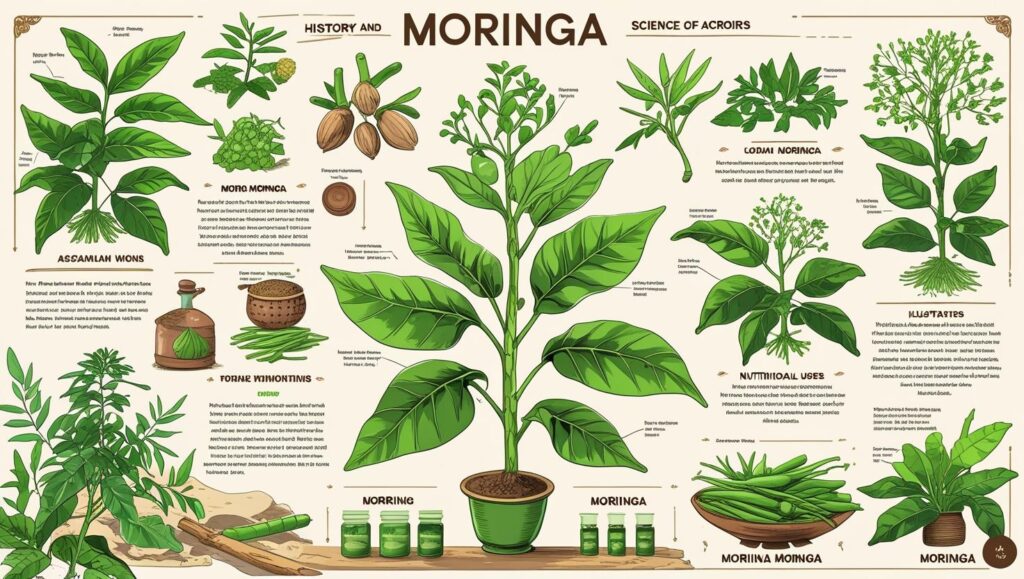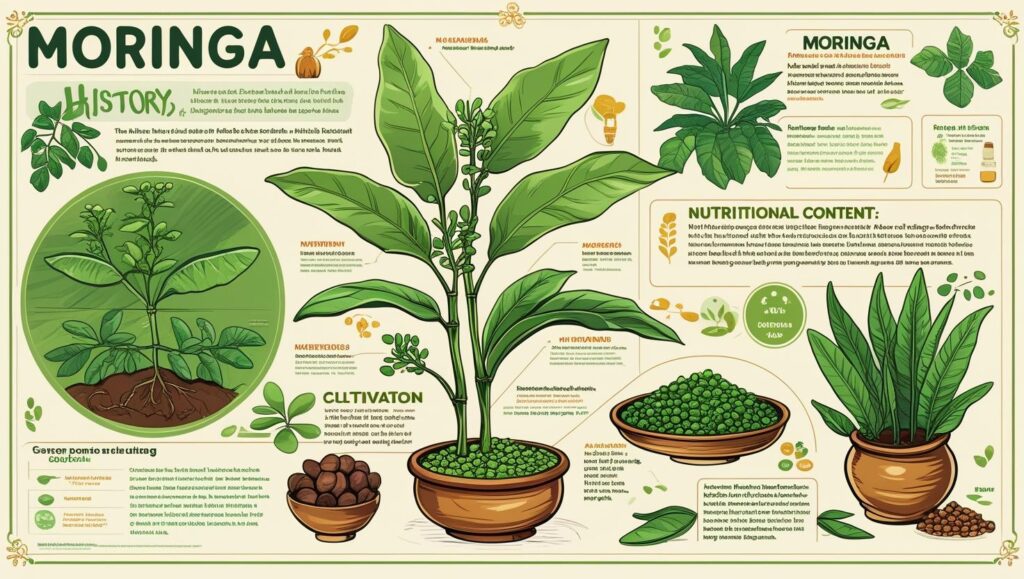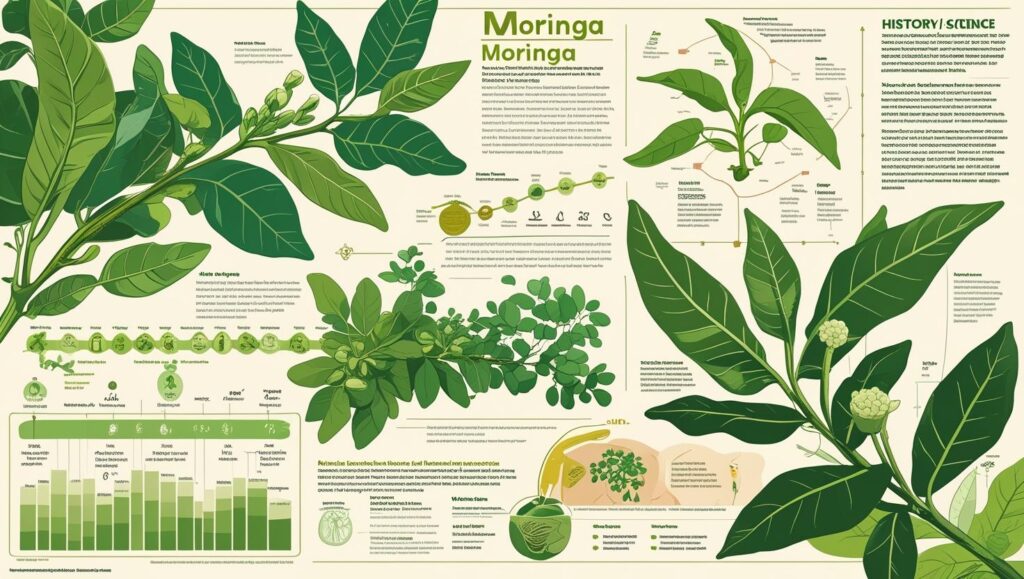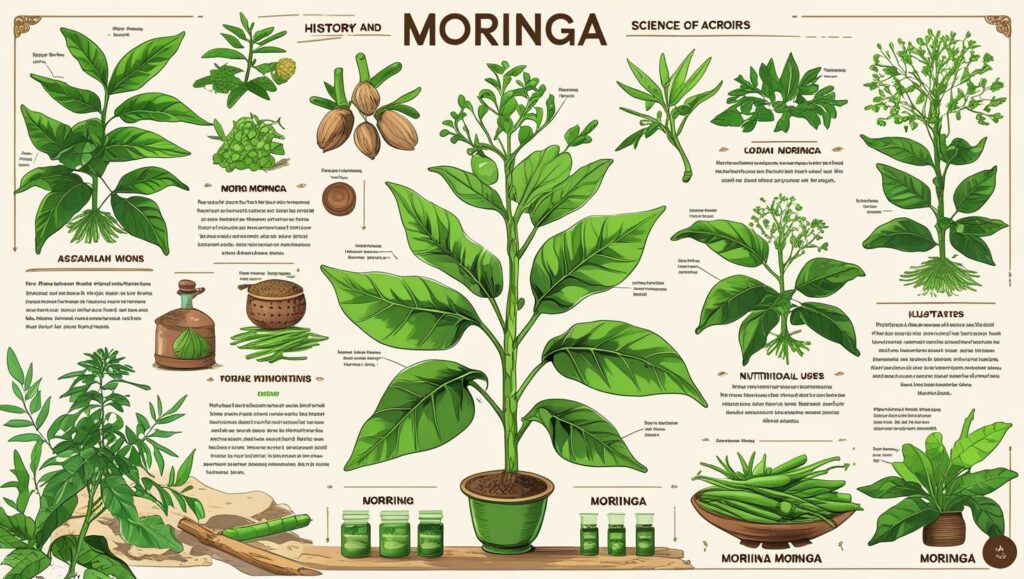Introduction
Moringa, often referred to as the “Miracle Tree” or “Drumstick Tree,” has gained global recognition for its exceptional nutritional and medicinal properties. Scientifically known as Moringa oleifera, this plant has been used for centuries in traditional medicine and cuisine. In recent years, modern science has validated many of its health benefits, making it a popular superfood.

This article explores the rich history of moringa, its scientific benefits, frequently asked questions, and why it continues to be a powerhouse of nutrition.
The History of Moringa
Ancient Origins
Moringa is native to the Himalayan foothills in India and has been cultivated for over 4,000 years. Ancient civilizations, including the Egyptians, Greeks, and Romans, recognized its medicinal value. Historical records suggest that:
- Ayurvedic medicine (dating back to 1500 BCE) used moringa to treat over 300 ailments.
- Egyptians utilized moringa oil for skincare and embalming.
- Ancient Greeks employed it for its therapeutic properties.
Spread Across the World
Through trade and colonization, moringa spread to Africa, Southeast Asia, and the Americas. Today, it is widely grown in tropical and subtropical regions, including:
- Africa (Ethiopia, Sudan, Kenya)
- Asia (Philippines, Indonesia, Sri Lanka)
- Latin America (Mexico, Brazil, Cuba)
Modern Rediscovery
In the 20th century, scientists began studying moringa’s nutritional profile, leading to its recognition as a “superfood.” Organizations like the World Health Organization (WHO) and Food and Agriculture Organization (FAO) promote moringa as a solution to malnutrition in developing countries.
The Science Behind Moringa’s Benefits

Moringa is packed with essential nutrients, antioxidants, and bioactive compounds. Here’s a breakdown of its key components and their benefits:
1. Nutritional Powerhouse
Moringa leaves contain:
- Vitamins: A (beta-carotene), B1 (thiamine), B2 (riboflavin), B3 (niacin), B6, C, and E.
- Minerals: Calcium, potassium, iron, magnesium, phosphorus, and zinc.
- Protein: Contains all nine essential amino acids, making it a rare plant-based complete protein.
- Fiber: Supports digestion and gut health.
Comparison: Gram-for-gram, moringa has:
- 7x more vitamin C than oranges
- 10x more vitamin A than carrots
- 17x more calcium than milk
- 25x more iron than spinach
2. Antioxidant and Anti-Inflammatory Properties

Moringa is rich in antioxidants like quercetin, chlorogenic acid, and beta-carotene, which help combat oxidative stress and inflammation. Studies suggest it may:
- Reduce risk of chronic diseases (diabetes, heart disease, cancer).
- Lower blood sugar levels (beneficial for diabetics).
- Protect against neurodegenerative diseases (Alzheimer’s, Parkinson’s).
3. Supports Heart Health
Research indicates that moringa can:
- Lower cholesterol levels (LDL “bad” cholesterol).
- Regulate blood pressure due to its high potassium content.
- Prevent plaque buildup in arteries.
4. Boosts Immunity and Fights Infections
Moringa has antibacterial, antiviral, and antifungal properties. It has been used to treat:
- Bacterial infections (E. coli, Salmonella).
- Viral infections (herpes, HIV support therapy).
- Fungal infections (Candida).
5. Enhances Energy and Brain Function
Due to its high iron and B-vitamin content, moringa helps:
- Combat fatigue and anemia.
- Improve cognitive function and memory.
- Reduce symptoms of anxiety and depression.
6. Promotes Skin and Hair Health

Moringa oil (Ben oil) is used in cosmetics for its:
- Moisturizing and anti-aging effects.
- Acne-fighting properties.
- Hair growth stimulation.
Frequently Asked Questions (FAQ)
1. Is moringa safe for everyone?
Yes, moringa is generally safe, but:
- Pregnant women should avoid high doses (may cause uterine contractions).
- Those on blood pressure or diabetes medications should consult a doctor (moringa may enhance drug effects).
2. How should I consume moringa?
Common forms include:
- Powder: Added to smoothies, soups, or teas.
- Capsules/Tablets: For easy supplementation.
- Oil: Used in cooking or skincare.
- Fresh leaves: Cooked in dishes like soups and stews.
3. Does moringa help with weight loss?
Yes, due to its:
- High fiber content (promotes fullness).
- Metabolism-boosting properties.
- Low calorie count.
4. Can moringa cure diseases?
While moringa has medicinal properties, it is not a cure but may help prevent or manage conditions like diabetes, inflammation, and malnutrition.
5. Where can I buy moringa?
Available at:
- Health food stores.
- Online retailers (Amazon, iHerb).
- Local markets (in regions where it’s grown).
6. How much moringa should I take daily?
Recommended dosage:
- Powder: 1-2 teaspoons per day.
- Capsules: Follow manufacturer instructions (usually 1-2 per day).
Conclusion
Moringa’s rich history and scientifically proven benefits make it one of the most valuable plants in the world. From ancient Ayurvedic remedies to modern superfood status, its nutritional density and medicinal properties continue to impress researchers and health enthusiasts alike.
Whether you’re looking to boost immunity, improve heart health, or enhance skin and hair, incorporating moringa into your diet can provide numerous health benefits. However, as with any supplement, moderation and consultation with a healthcare provider are key.
With its potential to combat malnutrition and chronic diseases, moringa truly lives up to its name as the “Miracle Tree.”

Leave a Reply